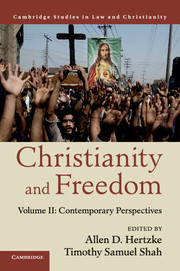Book contents
- Frontmatter
- Colophon
- Contents
- Contributing Authors
- Acknowledgments
- Introduction: Christianity and Freedom in the Contemporary World
- 1 Persecution in the Context of Religious and Christian Demography, 1970–2020
- 2 Patterns and Purposes of Contemporary Anti-Christian Persecution
- 3 Where the Spirit Leads: Global Pentecostalism and Freedom
- 4 Christianity among the Marginalized: Empowering Poor Women in India
- 5 Transnational Christian Networks for Human Dignity
- 6 The Growth and Dynamism of Chinese Christianity
- 7 Christianity and Religious Freedom in Indonesia since 1998
- 8 Christianity and Freedom in India: Colonialism, Communalism, Caste, and Violence
- 9 Vietnam: Christianity's Contributions to Freedoms and Human Flourishing in Adversity
- 10 The Challenge and Leaven of Christianity in Pakistan
- 11 Christianity and the Challenge of Religious Violence in Northern Nigeria
- 12 Copts of Egypt: Defi ance, Compliance, and Continuity
- 13 Between the Hammer and the Anvil: Indigenous Palestinian Christianity in the West Bank
- 14 Christians in the State of Israel: Between Integration and Emigration
- 15 Arab Muslim Attitudes toward Religious Minorities
- 16 They That Remain: Syrian and Iraqi Christian Communities amid the Syria Confl ict and the Rise of the Islamic State
- Index
7 - Christianity and Religious Freedom in Indonesia since 1998
Published online by Cambridge University Press: 05 February 2016
- Frontmatter
- Colophon
- Contents
- Contributing Authors
- Acknowledgments
- Introduction: Christianity and Freedom in the Contemporary World
- 1 Persecution in the Context of Religious and Christian Demography, 1970–2020
- 2 Patterns and Purposes of Contemporary Anti-Christian Persecution
- 3 Where the Spirit Leads: Global Pentecostalism and Freedom
- 4 Christianity among the Marginalized: Empowering Poor Women in India
- 5 Transnational Christian Networks for Human Dignity
- 6 The Growth and Dynamism of Chinese Christianity
- 7 Christianity and Religious Freedom in Indonesia since 1998
- 8 Christianity and Freedom in India: Colonialism, Communalism, Caste, and Violence
- 9 Vietnam: Christianity's Contributions to Freedoms and Human Flourishing in Adversity
- 10 The Challenge and Leaven of Christianity in Pakistan
- 11 Christianity and the Challenge of Religious Violence in Northern Nigeria
- 12 Copts of Egypt: Defi ance, Compliance, and Continuity
- 13 Between the Hammer and the Anvil: Indigenous Palestinian Christianity in the West Bank
- 14 Christians in the State of Israel: Between Integration and Emigration
- 15 Arab Muslim Attitudes toward Religious Minorities
- 16 They That Remain: Syrian and Iraqi Christian Communities amid the Syria Confl ict and the Rise of the Islamic State
- Index
Summary
EXECUTIVE SUMMARY
With a population of almost 250 million people, 87.2 percent of whom are Muslim, Indonesia is today the largest Muslim majority society in the world. Some 9.9 percent of the population is Christian, 7 percent Protestant; 2.9 percent Catholic. Indonesia is also third largest and one of the younger among the world's democracies, having undergone a transition from authoritarian rule to electoral democracy in May 1998.
Christian leaders interviewed in 2013 for this report were of the opinion that Christians enjoyed a freer and more socially favorable situation prior to the events of 1998 and that the country's transition to a more open political system has heightened social and religious tensions. Christian interviewees pointed to a heightened frequency of attacks on church buildings, greater difficulty in securing permits for the construction of churches and schools, and pressures to restrict the number of Christians in the higher levels of state administration, among other obstacles, as evidence of a relative deterioration in interreligious relations. However, these same Christian officials were unhesitant in affirming that the transition to democracy is necessary and important and that the best way to address current deficiencies is by working with Muslims and others to promote the rule of law and multireligious tolerance. Some officials criticized earlier generations of Christian leaders for being too accommodating to the Indonesian state. Most felt that the resources for pluralist coexistence, including those in the Muslim community, were still strong but had yet to be fully mobilized or backed up by an effective legal system.
The Indonesian case importantly illustrates that although Christians have made signal contributions to Indonesian politics, culture, and education, Dutch colonialism and the mission system it promoted were premised on a corporatist and consociational rather than liberal model of religious freedom. For most of their 350 years in the archipelago, the Dutch prioritized their commercial and political interests and discouraged missionization in all but a few regions. When, at the end of the nineteenth century, the Dutch gave the green light to missionaries, their policies set aside specific territories for individual denominations, encouraging a close identification of region, ethnicity, and denomination rather than religious liberty or individualistic voluntarism.
Since independence, most Indonesian Christians have advocated policies supportive of religious freedom. But they have done so in a framework that accepts the broadly consociational patterns of religious governance inherited from the Dutch.
- Type
- Chapter
- Information
- Christianity and Freedom , pp. 191 - 221Publisher: Cambridge University PressPrint publication year: 2016
- 1
- Cited by



